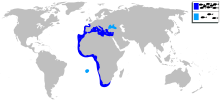Sargo
This article is about the fish. For the U.S. Navy ships named Sargo, see USS Sargo. For the town in Burkina Faso, see Sargo, Burkina Faso.
| Sargo | |
|---|---|
 | |
 | |
| Scientific classification | |
| Kingdom: | Animalia |
| Phylum: | Chordata |
| Class: | Actinopterygii |
| Order: | Perciformes |
| Family: | Sparidae |
| Genus: | Diplodus |
| Species: | D. sargus |
| Binomial name | |
| Diplodus sargus Linnaeus, 1758 | |
 | |
| Synonyms | |
|
Sargus rondelettii Valenciennes, 1830 | |
Diplodus sargus, called White seabream and Sargo, is a species of seabream native to the eastern Atlantic and western Indian Oceans.[1] It is found from the Bay of Biscay southwards to South Africa, including Madeira and the Canary Islands, the Mediterranean and (rarely) the Black Sea. Occasionally individuals are found off the Indian Ocean coasts of South Africa, Mozambique and Madagascar, and they are very rarely found elsewhere in the Indian Ocean, such as off Oman. An active fish, they inhabit the surf zone, but they may be found down to 50 m.
They consume small crustaceans, mollusks and some seaweed and coral, using their strong jaws to crush shells. Individuals can reach 45 cm, but average 22 cm.
Diplodus sargus are protandrous hermaphrodites, with individuals starting out life as males, and some becoming female later on.
It is commercially fished, with 3,713 t taken in 2008.[1] Some are reared using aquacultural techniques. The catch is eaten immediately or marketed locally, as the flesh tastes good only when fresh.
Two US Navy submarines were named for this nimble fish, USS Sargo (SS-188) and USS Sargo (SSN-583).
Subspecies
The species has seven good subspecies, which are found in particular locales:
- Diplodus sargus ascensionis (Valenciennes, 1830), off Ascension Island
- Diplodus sargus cadenati (de la Paz, et al., 1974), off the European and West African coasts, and off Madeira and the Canary Islands
- Diplodus sargus capensis (Smith, 1846): off Angola, South Africa and Mozambique
- Diplodus sargus helenae (Sauvage, 1879): off Saint Helena Island
- Diplodus sargus kotschyi (Steindachner, 1876): off Madagascar and other places in the Indian Ocean
- Diplodus sargus lineatus (Valenciennes, 1830): off the Cape Verde Islands
- Diplodus sargus sargus (Linnaeus, 1758) in the Mediterranean and Black Seas
References
- 1 2 "Diplodus sargus". Fisheries Global Information System. Food and Agriculture Organization of the United Nations. Retrieved 4 May 2011.
External links
| Wikispecies has information related to: Diplodus sargus |
| Wikimedia Commons has media related to Diplodus sargus. |
- Diplodus sargus at the Encyclopedia of Life
- Froese, Rainer and Pauly, Daniel, eds. (2010). "Diplodus sargus sargus" in FishBase. October 2010 version.
- "Diplodus sargus". Integrated Taxonomic Information System. Retrieved 4 May 2011.